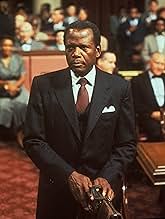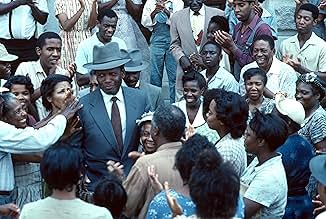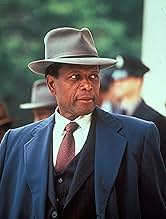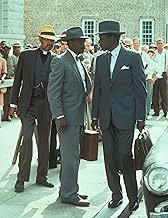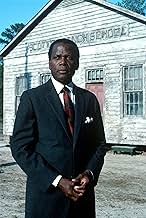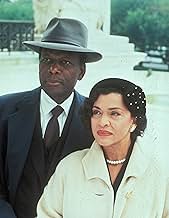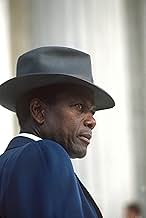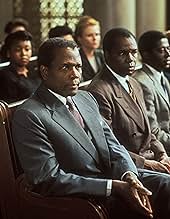Una dramatización del caso judicial estadounidense que destruyó la validez legal de la segregación racial.Una dramatización del caso judicial estadounidense que destruyó la validez legal de la segregación racial.Una dramatización del caso judicial estadounidense que destruyó la validez legal de la segregación racial.
- Ganó 2 premios Primetime Emmy
- 3 premios ganados y 12 nominaciones en total
Explorar episodios
Opiniones destacadas
`John, if this case goes before the Supreme Court. . . I'm gonna need you'
It's the early 1950's, in America. The governor of South Carolina (James Francis Byrnes), in his 70's at the time, pays a visit to his friend, the famous John W. Davis. Davis had argued 138 cases in front of the Supreme Court. Byrnes was turning to him for help.
Byrnes was determined to show that discrimination and segregation of public schools were not the same thing. He wanted black school children to have equal schools. He was ashamed of the terrible condition the black schools were in, in his state of South Carolina. He even levied a three percent sales tax to fund the improvement of black schools. He was prepared to spend 75 million dollars to improve the public schools for black children in his state.
But he knew, that the small case that a few courageous people (Harry Briggs, Reverand J.A. Delaine) had started in Clarendon county, SC, was too big of an issue for his efforts alone. The case was on it's way to the Supreme Court of the United States of America.
The National Association for the Advancement of Colored People (the NAACP), had become involved. Their head lawyer, Thurgood Marshall had combined this case and 4 other similar cases (from Delaware, Kansas, DC and Virginia) into one called 'Brown v. Board of Education', and made it his mission to strike down segregation in public schools in America.
The great thing about this movie is how it makes each side look respectable. The movie does not make this a 'bad evil white men against poor suffering black people' type of story. But rather, the film, portrays the white men as being highly respected, educated and willing to do the right thing. But at the same time, very concerned and perhaps even afraid of the consequences of their decisions.
I also loved the humor in this film. For example when Byrnes is conversing with Davis and says 'I admit to past sins, our colored schools are a disgrace'. Or when one of the lawyers at the NAACP legal defense fund says about the South Carolina case "If we win this one, we'll only have 11,172 school districts left"
The heart of this film is the uncommon courage of the people. Courage among so many involved. Of course, first from the blacks from those small towns, who risked their jobs and safety, and faced the hate of the Ku Klux Klan, by taking these complaints to their local lawyers. Then, to the NAACP, for climbing this long and expensive uphill battle. But also, to the judges on the Supreme Court, and in particular the Chief Judge Earl Warren.
Warren was quoted as saying 'Everything that I did in life that was worthwhile, I caught hell for'. What a difficult decision, but what a remarkable effort on his part to unite the nine members of the Supreme Court to conclude the case with a unanimous decision to end segregation in public schools in America.
It took a lot of brave people on both sides, to end separation of black and white school children in public schools. Perhaps Thurgood Marshall summed it up best, when he mocked the thinking of people in the south by saying 'you can have them attending the same State Universities and Graduate schools, but if they attend the same elementary and high schools together, the world would fall apart.'
A wonderful treasured movie. Must see for all.
It's the early 1950's, in America. The governor of South Carolina (James Francis Byrnes), in his 70's at the time, pays a visit to his friend, the famous John W. Davis. Davis had argued 138 cases in front of the Supreme Court. Byrnes was turning to him for help.
Byrnes was determined to show that discrimination and segregation of public schools were not the same thing. He wanted black school children to have equal schools. He was ashamed of the terrible condition the black schools were in, in his state of South Carolina. He even levied a three percent sales tax to fund the improvement of black schools. He was prepared to spend 75 million dollars to improve the public schools for black children in his state.
But he knew, that the small case that a few courageous people (Harry Briggs, Reverand J.A. Delaine) had started in Clarendon county, SC, was too big of an issue for his efforts alone. The case was on it's way to the Supreme Court of the United States of America.
The National Association for the Advancement of Colored People (the NAACP), had become involved. Their head lawyer, Thurgood Marshall had combined this case and 4 other similar cases (from Delaware, Kansas, DC and Virginia) into one called 'Brown v. Board of Education', and made it his mission to strike down segregation in public schools in America.
The great thing about this movie is how it makes each side look respectable. The movie does not make this a 'bad evil white men against poor suffering black people' type of story. But rather, the film, portrays the white men as being highly respected, educated and willing to do the right thing. But at the same time, very concerned and perhaps even afraid of the consequences of their decisions.
I also loved the humor in this film. For example when Byrnes is conversing with Davis and says 'I admit to past sins, our colored schools are a disgrace'. Or when one of the lawyers at the NAACP legal defense fund says about the South Carolina case "If we win this one, we'll only have 11,172 school districts left"
The heart of this film is the uncommon courage of the people. Courage among so many involved. Of course, first from the blacks from those small towns, who risked their jobs and safety, and faced the hate of the Ku Klux Klan, by taking these complaints to their local lawyers. Then, to the NAACP, for climbing this long and expensive uphill battle. But also, to the judges on the Supreme Court, and in particular the Chief Judge Earl Warren.
Warren was quoted as saying 'Everything that I did in life that was worthwhile, I caught hell for'. What a difficult decision, but what a remarkable effort on his part to unite the nine members of the Supreme Court to conclude the case with a unanimous decision to end segregation in public schools in America.
It took a lot of brave people on both sides, to end separation of black and white school children in public schools. Perhaps Thurgood Marshall summed it up best, when he mocked the thinking of people in the south by saying 'you can have them attending the same State Universities and Graduate schools, but if they attend the same elementary and high schools together, the world would fall apart.'
A wonderful treasured movie. Must see for all.
Sidney Poitier was the perfect actor to play Thurgood Marshall as an attorney for the NAACP in the fifties. Burt Lancaster gives a final performance but one of his best as legal legend, John W. Davis. The supporting cast is excellent. This mini series is about the legal process that can be long, tedious, and time consuming for years. This case starts off when a small town African American minister, teacher, and principal seeks a school bus for his students. When the superintendent blows off the request, the minister goes forward and seeks counsel. The minister and the plaintiffs experience hostility, threats, violence, and more hatred. This film has to be shown in schools to understand American history, a shameful chapter in history.
It's the dramatization of the case Brown v. Board of Education. It starts with a need for a bus and ends with the finish of segregation. This is a two-part series totalling three hours of television. Sidney Poitier plays NAACP lawyer Thurgood Marshall who would go on to become a Supreme Court judge.
I am not always a fan of courtroom dramas especially when the result is already known. The court case part may be informative but not the most dramatic. It is everything around the court case that is truly fascinating. The plaintiffs' stories are interesting. Nowadays, this case is taken as a given, but it's not a given at the time. This is educational and sometimes compelling TV.
I am not always a fan of courtroom dramas especially when the result is already known. The court case part may be informative but not the most dramatic. It is everything around the court case that is truly fascinating. The plaintiffs' stories are interesting. Nowadays, this case is taken as a given, but it's not a given at the time. This is educational and sometimes compelling TV.
The relatively peaceful correction through the legal process of an age old wrong is the United States of America at its very best. That is in fact what occurred in the landmark Brown vs. Board of Education decision in 1954.
Looking back at that case 52 years later the most significant result of that decision was not in our domestic affairs, but in foreign policy. We were engaged in a Cold War at the time where we vying for the moral leadership of the world against the Soviet Union. If we had not put our own house in order, we would never have gotten any kind of support from any third world nations and never would have triumphed in the Cold War.
And it was all for want of a school bus. Black kids in rural Clarendon County, South Carolina had to walk miles to their designated school because the whites running the board of education of that county wouldn't give them a bus. That was the start of the lawsuit that eventually found it's way to the United States Supreme Court.
I suppose it is fitting that one black icon be playing the part of another in this film. Sidney Poitier is very good as Thurgood Marshall, the attorney for the National Association for the Advancement of Colored People who believed in the case and fought for it. And like the ending of a fairy tale, Thurgood Marshall was appointed to the Supreme Court where he won the case. But that's later on in his life.
Burt Lancaster's farewell performance is of John W. Davis, called the lawyer's lawyer by a host of his colleagues and in fact that is the title of a biography about him. From 1911 to 1921 he was in succession, a Congressman from West Virginia, Solicitor General of the United States and our Ambassador to Great Britain. He left public life after that except in 1924 he was chosen after 103 ballots as a compromise Democratic presidential candidate, but lost to Calvin Coolidge.
Oddly enough though it was after becoming a losing presidential candidate that Davis gained his greatest reputation as one of our country's leading attorneys. He worked for big corporations and earned some mighty big fees, but he also did a lot of pro bono work as well. Sad, but his association with racial segregation forever tarnished his reputation. Lancaster plays him with restraint and dignity and Burt was just around the age Davis would have been in arguing before the Supreme Court.
The third lead in this is Richard Kiley as Chief Justice Earl Warren. Warren, a liberal Republican Governor of California, was appointed to the bench by Dwight Eisenhower while the Court was considering the case. In fact Ike made another appointment of John Marshall Harlan in place of Robert H. Jackson and those two appointments probably won the case for the NAACP.
Kiley comes across as the Earl Warren we remember as Chief Justice, a man who brought common sense to his judicial philosophy. Considered probably one of the three greatest whoever held the job as Chief Justice, the USA is still feeling the political and social impact of the many decisions he led the court in rendering.
Warren's problem was that he desperately wanted a unanimous court in this landmark decision. Yet there were a few of the Justices for reasons of precedent and their own personal backgrounds who did not want to take this momentous step.
The key scene for Kiley is when on a trip with his black chauffeur after a night in a hotel, Kiley goes out and finds the man has slept in his car because he can't find a hotel that will accommodate blacks. It was a defining moment for Earl Warren in real life and Kiley in the film. He knew he was being given a great chance to right a great wrong and stop something evil. The moral impact of segregation was felt by Kiley and by the audience as well.
Separate But Equal is a great historical drama which humanizes the players in an American success story.
Looking back at that case 52 years later the most significant result of that decision was not in our domestic affairs, but in foreign policy. We were engaged in a Cold War at the time where we vying for the moral leadership of the world against the Soviet Union. If we had not put our own house in order, we would never have gotten any kind of support from any third world nations and never would have triumphed in the Cold War.
And it was all for want of a school bus. Black kids in rural Clarendon County, South Carolina had to walk miles to their designated school because the whites running the board of education of that county wouldn't give them a bus. That was the start of the lawsuit that eventually found it's way to the United States Supreme Court.
I suppose it is fitting that one black icon be playing the part of another in this film. Sidney Poitier is very good as Thurgood Marshall, the attorney for the National Association for the Advancement of Colored People who believed in the case and fought for it. And like the ending of a fairy tale, Thurgood Marshall was appointed to the Supreme Court where he won the case. But that's later on in his life.
Burt Lancaster's farewell performance is of John W. Davis, called the lawyer's lawyer by a host of his colleagues and in fact that is the title of a biography about him. From 1911 to 1921 he was in succession, a Congressman from West Virginia, Solicitor General of the United States and our Ambassador to Great Britain. He left public life after that except in 1924 he was chosen after 103 ballots as a compromise Democratic presidential candidate, but lost to Calvin Coolidge.
Oddly enough though it was after becoming a losing presidential candidate that Davis gained his greatest reputation as one of our country's leading attorneys. He worked for big corporations and earned some mighty big fees, but he also did a lot of pro bono work as well. Sad, but his association with racial segregation forever tarnished his reputation. Lancaster plays him with restraint and dignity and Burt was just around the age Davis would have been in arguing before the Supreme Court.
The third lead in this is Richard Kiley as Chief Justice Earl Warren. Warren, a liberal Republican Governor of California, was appointed to the bench by Dwight Eisenhower while the Court was considering the case. In fact Ike made another appointment of John Marshall Harlan in place of Robert H. Jackson and those two appointments probably won the case for the NAACP.
Kiley comes across as the Earl Warren we remember as Chief Justice, a man who brought common sense to his judicial philosophy. Considered probably one of the three greatest whoever held the job as Chief Justice, the USA is still feeling the political and social impact of the many decisions he led the court in rendering.
Warren's problem was that he desperately wanted a unanimous court in this landmark decision. Yet there were a few of the Justices for reasons of precedent and their own personal backgrounds who did not want to take this momentous step.
The key scene for Kiley is when on a trip with his black chauffeur after a night in a hotel, Kiley goes out and finds the man has slept in his car because he can't find a hotel that will accommodate blacks. It was a defining moment for Earl Warren in real life and Kiley in the film. He knew he was being given a great chance to right a great wrong and stop something evil. The moral impact of segregation was felt by Kiley and by the audience as well.
Separate But Equal is a great historical drama which humanizes the players in an American success story.
When making a film about the historic Brown vs. Board of Education case, who would be the obvious choice to play civil rights icon Thurgood Marshall? If you answered Sidney Poitier, you agreed with the casting director of Separate But Equal. The movie chronicles the journey in the 1950s for racial equality and desegregation in the school system.
In his final film, Burt Lancaster plays John W. Davis. Richard Kiley plays Chief Justice Earl Warren, and he—and Sidney—were nominated for Golden Globes that year. Joining the supporting cast are Cleavon Little, Gloria Foster, John McMartin, Graham Beckel, and Lynne Thigpen. George Stevens Jr.'s script is something to be admired, since he tried very hard to make it historically accurate and interesting to television audiences. It's not the best American history movie ever made, and it's certainly not a good choice if you've never seen a Sidney Poitier or Burt Lancaster movie, but if you know your history and want to watch a three-hour tribute to this slice of Americana, go ahead and rent it. It does feel pretty cheesy at times, and Sidney Poitier tends to overact more often than not in his scenes, but overall, it's a great movie for high school students to watch as an addendum to their curriculum.
In his final film, Burt Lancaster plays John W. Davis. Richard Kiley plays Chief Justice Earl Warren, and he—and Sidney—were nominated for Golden Globes that year. Joining the supporting cast are Cleavon Little, Gloria Foster, John McMartin, Graham Beckel, and Lynne Thigpen. George Stevens Jr.'s script is something to be admired, since he tried very hard to make it historically accurate and interesting to television audiences. It's not the best American history movie ever made, and it's certainly not a good choice if you've never seen a Sidney Poitier or Burt Lancaster movie, but if you know your history and want to watch a three-hour tribute to this slice of Americana, go ahead and rent it. It does feel pretty cheesy at times, and Sidney Poitier tends to overact more often than not in his scenes, but overall, it's a great movie for high school students to watch as an addendum to their curriculum.
¿Sabías que…?
- TriviaThis was Burt Lancaster's final performance. On November 30, 1990, shortly after filming ended, he suffered a massive stroke and remained incapacitated for the final four years of his life.
- ErroresThe entire movie is set in the 1950s, but in at least one of the New York City street scenes, both the pedestrians' clothing and the cars on the street appear to date from the late 1960s to the 1970s.
- ConexionesFeatured in The 43rd Annual Primetime Emmy Awards (1991)
Selecciones populares
Inicia sesión para calificar y agrega a la lista de videos para obtener recomendaciones personalizadas
- How many seasons does Separate But Equal have?Con tecnología de Alexa
Detalles
- Fecha de lanzamiento
- País de origen
- Idioma
- También se conoce como
- Skilda världar
- Locaciones de filmación
- Productoras
- Ver más créditos de la compañía en IMDbPro
Contribuir a esta página
Sugiere una edición o agrega el contenido que falta


